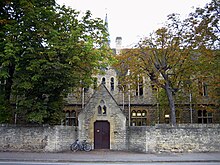St. Antony's College, Oxford
| St Antony's College | |
|---|---|
 |
|

Blazon: Or on a chevron between three tau crosses gules as many pierced mullets of the field.
|
|
| University | Oxford |
| Location | Between , Bevington Road and Winchester Road |
| Coordinates | 51°45′47″N 1°15′46″W / 51.763149°N 1.262903°WCoordinates: 51°45′47″N 1°15′46″W / 51.763149°N 1.262903°W |
| Latin name | Collegium Sancti Antonii |
| Motto | Plus est en vous |
| Established | 1950 |
| Named for | St Antony of Egypt |
| Sister college | Wolfson College, Cambridge |
| Warden | Margaret MacMillan |
| Undergraduates | None |
| Postgraduates | 400 |
| Website | www |
| Boat club | Boat Club |
| Map | |
St Antony's College is one of the constituent colleges of the University of Oxford in England. Founded in 1950 as the result of the gift of French merchant Sir Antonin Besse of Aden, St Antony's is the most cosmopolitan of the University of Oxford's colleges and is considered to be a centre of excellence for study and research in the fields of international relations, economics, politics, and area studies. The college's areas of specialist study include Europe, Russia and the former Soviet states, Latin America, the Middle East, Africa, Japan, China, and South and South East Asia.
The college is located in North Oxford, with to the west, Bevington Road to the south and Winchester Road to the east. As of 2012, St Antony's had an estimated financial endowment of £30m.
St Antony's was founded in 1950 as the result of the gift of Sir Antonin Besse of Aden, a merchant of French descent.
In 1947, Besse was considering giving around £2 million to the University of Oxford to found a new college. Ultimately, on the advice of his solicitor, R Clyde, who had attended New College, Besse decided to go ahead with the plan and permitted Clyde to approach the university with the offer. The university was initially unreceptive to the offer, and recommended that Besse instead devote his funds to improving the finances of some of the poorer existing colleges. Eventually Besse acquiesced, contributing a total of £250,000 in varied amounts to the following colleges: Keble, Worcester, St Peter's, Wadham, Exeter, Pembroke, Lincoln and St Edmund Hall. After this large contribution, the university decided to reconsider Besse's offer to help found a new college and, recognising the need to provide for the ever-growing number of postgraduate students coming to Oxford, gave the venture their blessing; and in 1948, Besse signed a deed of trust appointing the college's first trustees.
...
Wikipedia

